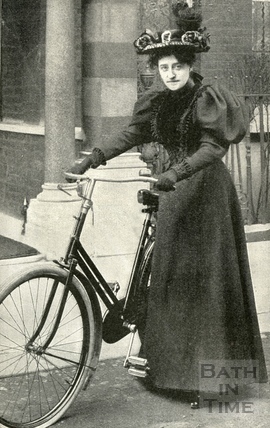Feminism, as we know it, has been an essential part of Western societies history since first wave feminism began in the 1800’s. Now that we have entered third wave feminism, there is a lot of debate around the negative aspects of modern feminism. One of the main arguments is that western women do not need feminism. While I do agree that third-world feminist issues should be addressed first, as I have discussed before, feminism is definitely still needed in first-world countries as well.
Many modern feminists look up to the New Woman figure of the 1800’s and take a very keen interest in New Woman fiction that was published during the first wave of feminism. I myself am one of these people, so when I discovered that I would be learning all about the Irish New Woman in my Victorian literature module this semester, I was more excited than I would like to admit.
The term was coined by Sarah Grand and as Sarah Ledger explains, the New Woman was, “variously, a feminist activist, a social reformer, a popular novelist, a suffragette playwright, a woman poet; she was also a fictional construct, a discursive response to the activities of the late nineteenth-century women’s movement.”

While sitting in a lecture about the Irish New Woman, I was admittedly much more attentive than I usually am. It was then that I heard my lecture mention something, almost in passing, that I became quite fixated on. Although what the New Woman writers did to help women’s rights and to change the perspective of women was incredibly admirable and necessary, they had some other questionable ethics that are often forgotten about.
The best example of this comes back to Sarah Grand who is often considered to be one of the most important Irish New Woman writers, despite being born in England. It is widely known that Sarah Grand believed that women and men should be equal but the fact that she was also a strong believer in eugenics is often left out. As Angelique Richardson explains in the book “Love and Eugenics in the Late Nineteenth Century“, “Sarah Grand was a committed exponent of biological determinism and eugenic feminism.”
She even suggests these views in her work. An example of this is seen in her novel, “Two Dear Little Feet”, as she says, “African Negroes, Bushmen of Australia, and, indeed, all low savage races, have broad, flat feet, thick ankles near the ground, low heels, and badly-formed calves to their legs; while in higher races the feet and legs are well-formed.” These racist and classist views were not only that of Sarah Grand, but they were very often shared by other New Woman writers as these views were commonly seen amongst the higher classes in the 1800’s.
I don’t really believe that these views held by Sarah Grand, or any other New Woman writer, are enough to completely disregard what she did for feminist literature. However, I do find it incredibly interesting that these details are often left out when discussing the views and opinions of the New Woman.
Maybe this is a very odd version of the saying, “you should never meet your heroes“. Instead, you should never research your heroes too much.